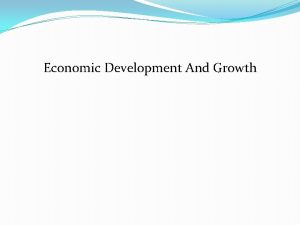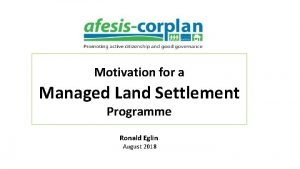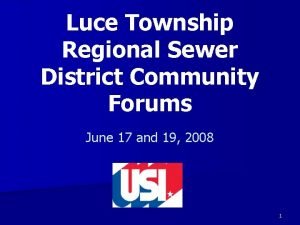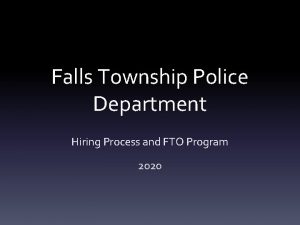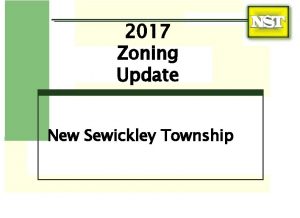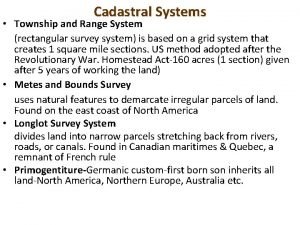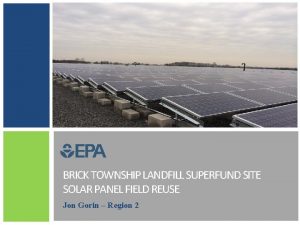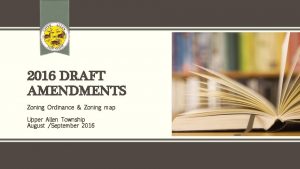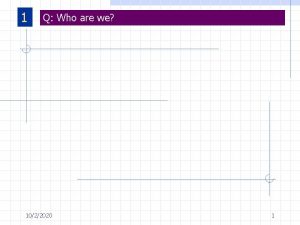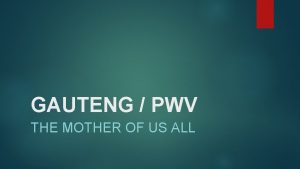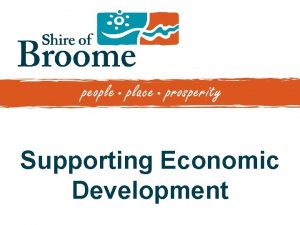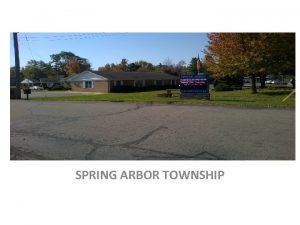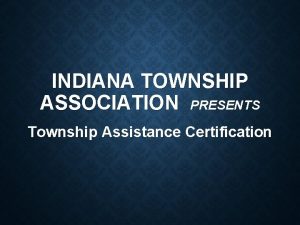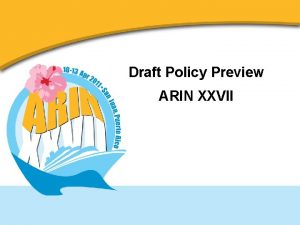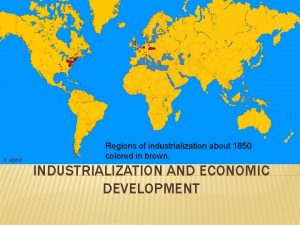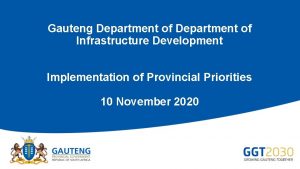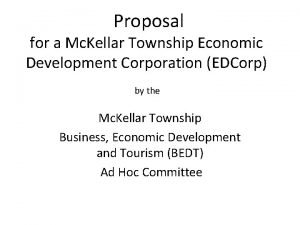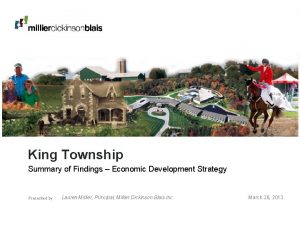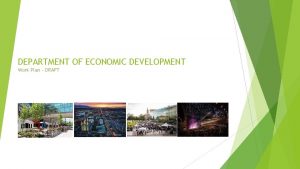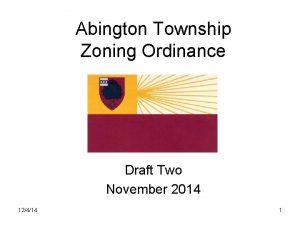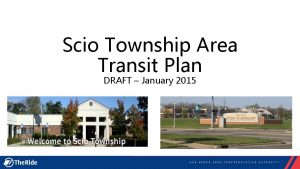GAUTENG DEPARTMENT OF ECONOMIC DEVELOPMENT DRAFT GAUTENG TOWNSHIP






























- Slides: 30

GAUTENG DEPARTMENT OF ECONOMIC DEVELOPMENT DRAFT GAUTENG TOWNSHIP ECONOMIC DEVELOPMENT BILL STAKEHOLDER CONSULTATION PHASE

2 OUTLINE • Introduction • Township Economy /GGT 2030 Policy Context • Objectives of the Bill • Provisions of the Bill (Clauses): – Chapter 1 : Preliminary Provisions – Chapter 2 : Designation of Township Areas – Chapter 3 : Business Activities Reserved for Citizens or Permanent Residents – Chapter 4: Regulation of Township Enterprises – Chapter 5: Promotion and Development of Township Enterprises – Chapter 6: Gauteng Township Economic Development Fund – Chapter 7: Miscellaneous Provisions – Chapter 8: General Provisions – Schedules • Constitutional and Legal Considerations 2

3 INTRODUCTION a) The bill is about taking deliberate steps to allow townships to become fully fledged commercial zones - both by streamlining the rules on where and how you can run a business , and by providing different kinds of programmatic support to SMMEs operating in townships. b) By making it easier to open a business and formalize a business in townships , as well as by providing specific support to township real estate and the taxi economy , the bill is designed to create enabling conditions for existing township businesses to expand hire people , and for new township businesses to start. Either way , at full implementation it will significantly boost job numbers a) The whole consultation approach is designed to solicit a wide range of inputs on which sectors should be targeted for citizen specific support - and input is also being gathered from groups representing foreign nationals 3

TOWNSHIP ECONOMY/GGT 2030 POLICY CONTEXT • The main objective of the Township Economy is to transform townships from consumption to production centres ensuring sustainable economy contributing approximately 30% to GDP by 2030. • The TMR programme represented GPG comprehensive policy response to the unique conditions and structural challenges facing our economy. • Township Economy Revitalisation (TER) strategy is aptly positioned as one of the key game changers in the drive to Transform, Modernise and Re-Industrialise (TMR) Gauteng Economy (GCR). • The overall purpose of the TER strategy is articulated in the following three key intended outcomes: – Creating the appropriate enabling environment based of strategic focus areas to revitalise the township economy; – Establishing the economic and social value of the township economy; and; – Ensuring that the township economy becomes the key player in the provincial economy. One critical provision of the TER includes - Ensuring appropriate legal and regulatory framework • Assessment and revision of legal framework to ensure that the regulatory and administrative framework does not hinder the development and growth of township enterprises

5 GROWING GAUTENG TOGETHER

TOWNSHIP ECONOMY ACTION PLAN FOCUS AREAS Bring opportunity to the many and confront inequality at the spatial level through the Township Economic Development Policy/ Action Plan a) Change how townships are regulated and governed to transform them into zones of widespread, job-creating commercial activity b) Set up better procurement rules and programmatic support which allow government and its main contractors to buy from large groups of townshipbased firms, with systems linking them so they can supply if they were one large firm c) Dedicated Financing mechanism for firms engaged in TER activities d) Deploy Installation, Repairs & Maintenance (IRM) initiative as consolidated buying platform for facilities management, maintenance and technical trades e) Promote consolidated buying via platforms with private sector partners f) Manufacturing cluster pilots g) Commercial rapid land release initiative h) Taxi Economy Initiative i) Township backyard real estate Initiative

7 SUMMARY OF THE PROCESS TO DATE collaboration The Department of Economic Development in partnership with Office of the Premier Policy Unit started a process of formulating the Policy Statement. The Township Economy Development policy statement has been completed in line with the prescribed legislative process undertaken for the development of an Act. The draft Bill currently undergoing public consultations (inputs and comments). Policy statement Exco approval A draft Policy developed and approved by EXCO thereby paving the way for the development process of the Bill. Closing date for comments is 30 November 2020 public The Draft Bill has been gazetted The Bill gazetted 7

8 OBJECT OF THE BILL (a)to provide a regulatory framework which makes it possible for people living in townships to establish viable and thriving business where they live; (b)to designate business activities within the township areas that are reserved for the exclusive and sole of citizens and persons who has permanent residency status in the Republic; (c) to promote the development and diversification of the economy of the Province through regulation of participation of township-based enterprises in certain sectors; (d) to introduce a enabling framework to ensure retail malls and supermarkets that are township-based partner with local township-based enterprises, including the sourcing of some of the products and services from local township-based producers, service providers and manufacturers. 8

9 OBJECT OF THE BILL (e) to establish specific procurement rules and programmatic support which allow government and its main contactors― (i) to buy from a large group or groups of township-based enterprises, with systems linking them so they can supply if they were one large enterprise; or (ii) to compel enterprises that get government contracts to spend a certain percentage of their procurement spent on town-based enterprises or entrepreneurs and cooperatives; (f) to provide an enabling environment for municipalities― (i) to develop taxi ranks into micro central business districts and to support taxi economy to use its scale to grow supporting value chains and industries; (ii) to support the development and promotion of township-based real estate development model to convert areas with high commercial densities into township high streets; and (g) to promote and support the development of representative associations of township-based enterprises and non-profit organisations. 9

10 PROVISIONS OF THE BILL Clause 1: a) This clause defines certain terms or key words that are used in the Bill. b) Most of the definitions are aligned to definitions as provided by the various legislations dealing with trade and empowerment of Black people. 10

11 PROVISIONS OF THE BILL Clause 2: This clause provides for the guiding principles of the Bill which seek to facilitate and promote inclusive growth by doing amongst others the following: • Providing for inclusive economy that harnesses all citizens of the Republic, • Diversity of ownership patterns • facilitation of easier access by new entrants in all sectors of the economy as well as transformative principles driving township economic interventions. • The focused interventions will be on sectors of economy with rapid growth potential, transformation, modernisation and reindustrialisation interventions, inclusive of social protection of vulnerable groups in the society. 11

ovides 12 PROVISIONS OF THE BILL Clause 3: Relates more to the object of the Bill (cited afore) Clause 4: This clause provides for the application of the Act within provincial organs of state and municipalities. clause Clause 5: This other laws and provides that in the event of conflict between this Act and any law which regulates township economic development or township-based enterprises in the Province, this Act will prevail. 12

13 PROVISIONS OF THE BILL Clause 7: This clause provides for the reservation of certain business activities for citizens or persons with permanent residency status. The business activities are listed in Column 3 of Table A of Schedule 2. This designation may be amended by the MEC through a notice in the Government Gazette after consultation with Provincial Legislature and cabinet members responsible for labour, employment and trade and industry. Certain factors that may be taken into consideration by the MEC include: affirming black people, women, youth and people with disabilities, growing economy, upstream production of primary resources or industrialisation, exploitation of readily available and developed expertise, a potential to absorb a large number of people into employment, opportunities for localisations, on the job training for skilled and unemployed and new graduates and increase in infrastructure investment and capital equipment. 13

14 PROVISIONS OF THE BILL 14

15 PROVISIONS OF THE BILL Clause 11: This clause provides for the formulation and monitoring of policies and programmes by the responsible Member. It requires the MEC to: • Implement policies for promoting and developing township-based enterprises, • Monitor efficiency enterprises, and performance of township-based • Establish data base of facilities and sources of finance, technology, raw material to promote accessibility to township-based enterprises, • Develop township entrepreneurship and arrange for independent training, management and consulting services to township-based enterprises as determined by the Minister of Finance. 15

16 PROVISIONS OF THE BILL clause Clause 12: This development of plans and strategies by provincial organs of state to support township-based enterprises with specific focus programmes and projects intended to contribute directly or indirectly to the establishment, development , support and promotions of township based enterprises and economic prosperity of township based enterprises, promoting and advancing the mainstreaming of youth, women and persons with disabilities in all township based programmes and projects. 16

17 PROVISIONS OF THE BILL 17

18 PROVISIONS OF THE BILL Clause 14: This clause provides for the development of infrastructure and other facilities necessary for the development and promotion of sector township-based enterprises which includes worksites, social amenities, business information centres, model centres of excellence, common usage facilities and other facilities necessary for development of sector township based enterprises. Clause 15: This clause provides for the provision of industrial and commercial estates to township-based enterprises by provincial organs of state, these include building or premises on which township enterprises may undertake designated business activity. 18

19 PROVISIONS OF THE BILL Clause 16: This clause provides for the letting of buildings or premises by provincial organs of state for use by sector township-based enterprises as an industrial or commercial estate. Clause 17: This clause provides for the promotion of capacity building projects in partnership with the public and private training institutions by providing business development services, promoting technology modernisation and developing and administering certified demand driven capacity building and entrepreneurship programmes for township based enterprises. 19

20 PROVISIONS OF THE BILL • Clause 18: This clause provides for the development of markets and provision of marketing services for sector township-based enterprises by provincial organs of state; - by establishing or identify markets for products generated by sector townshipbased enterprises; - providing linkages between sector township-based enterprises and potential markets; - organising trade fairs and shows in order to promote products generated by sector township-based enterprises; conducting market research, survey and analysis and share findings, conclusions and recommendations thereof with sector township-based enterprises; - and providing all such matters and things as may be necessary for the convenient use by sector township-based enterprises, including payment of stallages, rents, fees and tolls in respect of the use by any sector township-based enterprises at any market. 20

21 PROVISIONS OF THE BILL Clause 19: This clause provides for the promotion of technology transfer, acquisition and adaptation of new and modern technology by encouraging innovation and transfer of technology in order to increase competitiveness of township-based enterprises products and services; facilitating the registration and protection of intellectual property rights for sector township-based enterprises; providing incentives to encourage invention and innovation by sector township-based enterprises; establishment of (i) regional and other centres of excellence to enhance utilisation of locally available knowledge, skills and resources; and (ii) technology parks for graduating sector township-based enterprises; The clause further provides for the identification, collection, develop, modification packaging and disseminating technology and products to sector township-based enterprises; facilitation of sector township-based enterprises to access relevant equipment either through purchasing, leasing or franchising; conducting of research on available technologies with a view to improving such technologies, importing modern and appropriate technologies for use by sector township-based enterprises; developing, in collaboration with relevant institutions, programmes― (i) in standardisation and product development for different subsectors within sector township -based enterprises; and (ii) for improving credit access and other financial services by sector township-based enterprises; developing programmes to enable sector township-based enterprises comply with legislation, including in particular, environmental legislation; and mobilising funds and resources for the development of appropriate technology in relevant research institutions 21

22 PROVISIONS OF THE BILL This Clause 20: Gauteng Township Economic Development Fund. Clause 21: This clause provides for the purpose of the fund being to support the development of township-based enterprises, and to provide affordance and accessible credit or loans, guarantee the repayment of, or provide loan insurance or credit insurance of financial obligation undertaken by township-based enterprises; Clause 22: This clause provides for funds of the Fund which are monies as may be payable or transferred to the Fund pursuant to this Act or any other law; monies or assets as may accrue to or vest in the Fund under this Act; monies received by way of donations, gifts or grants given or made for the purpose of the Fund; interest accruing from loans and other forms of investment for the purpose of the Fund; and Monies from any other source provided or lent to the Fund. 22

23 PROVISIONS OF THE BILL Clause 23: This clause provides for the administration and management of the Fund which must be administered under the administration and control of the GEP, which must be appointed by and be responsible to the responsible Member for the purposes of this Act. The Board is, in accordance with the Public Finance Management Act, 1999 (Act No. 1 of 1999), the accounting authority for the Fund and is responsible for― (a) opening and managing an account in the name of the Fund with a registered bank in the Republic; (b) depositing in that account any money received by the Fund; (c) supervising and controlling the administration of the Fund; (d) approving of all township-based enterprises development and financing proposals; (e) entering into agreement with any person for the purpose of providing services to the Fund; (f) entering into agreements with financial institutions for the purpose of administering affordable and accessible credit to township enterprises; and (g) investing or deposing any money of the Fund that is not immediately required for contingencies or to meet current expenditure― (i) on a call account or short-term fixed deposit account with any registered bank or financial institution in the Republic; or (ii) in an investment account with the Corporation for Public Deposits established in terms of section 2 of the Corporation for Public Deposits Act, 1984 (Act No. 46 of 1984). 23

24 PROVISIONS OF THE BILL 24

25 PROVISIONS OF THE BILL Clause 26: This clause provides for the preparation and submission of the annual reports of the Fund by the Board which must provide the following information: (a) details of the performance of the Fund against key performance indicators; (b) report on the overall status, progress, impact and challenges or impediments in the implementation of the township-based development policies and programmes as well as the appropriate measures to address any challenges that must be taken by the responsible Member, including the Board’s projections; (c) report on the growth and development of township-based enterprises in the Province; (d) must, in addition to what is required by or in subsection (2), include financial statements of the Funds for the year which the report relates. The annual report must be tabled in the Provincial Legislature within one month of its report by the MEC. 25

26 PROVISIONS OF THE BILL 26

27 PROVISIONS OF THE BILL SCHEDULE 1 Table A – List of sectors, subsectors and activities reserved for citizens and permanent residents • Part B – Designated township areas SCHEDULE 2 • Amendment of laws SCHEDULE 3 • Matters to provide for in Model Standard By-laws – Building Standards – New commercial development – Undeveloped commercially viable land – Zoning – Commercialisation of taxi ranks – Commercial districts and high streets 27

28 CONSTITUTIONAL AND LEGAL CONSIDERATIONS a) The proposed Bill falls within the constitutional legislative competency of the Province. b) The Province must monitor the performance of municipalities with respect to all issues falling within the regulatory domain of Local Government by virtue of the Constitution (s 155) (6) (a). c) Section 14 (2) of the Municipal Systems Act, 2000 provides that a provincial government may design and adopt Standard Draft Bylaws (SDBs) on affairs listed in Schedules 4 B and 5 B of the Constitution. 28

29 GENERAL COMMENTS Foreign Participation: a) The bill gives the state and citizens an opportunity to formalize the vast majority of township based businesses in a streamlined way. This will allow the state to tackle a number of issues that have been kindling for xenophobia, such as the accusation that foreign businesses operate outside the tax net or use illegal inventory ( expired , black market etc). b) On all the questions regarding foreign nationals: 1. The bill focuses on affirming South Africans , rather than banning foreign nationals. 2. The bill expands the net of formality - making businesses easier to register and easier to fund , as well as making them eligible for government funded assistance. 3. The bill will reserve this assistance for citizens and permanent residents. 29

THANK YOU 30
 Heel and toe arrangement in carding
Heel and toe arrangement in carding Department of education ekurhuleni north district
Department of education ekurhuleni north district 10 pillars of gauteng department of education
10 pillars of gauteng department of education Vision and mission of gauteng department of education
Vision and mission of gauteng department of education Olmsted twp building department
Olmsted twp building department Economic growth vs economic development
Economic growth vs economic development Difference between economic growth and economic development
Difference between economic growth and economic development Lesson 2 our economic choices
Lesson 2 our economic choices Kzn webdhis
Kzn webdhis Nsla in education
Nsla in education Sapa gauteng
Sapa gauteng Gauteng rapid land release programme
Gauteng rapid land release programme Thnen
Thnen Spatial association ap human geography
Spatial association ap human geography Old bridge township public schools
Old bridge township public schools Lyons township grading scale
Lyons township grading scale Southampton township school district
Southampton township school district Luce township regional sewer district
Luce township regional sewer district Police defensive tactics
Police defensive tactics 780 turkeys live in merriam township
780 turkeys live in merriam township New sewickley township zoning map
New sewickley township zoning map Township and range definition ap human geography
Township and range definition ap human geography Township and range definition ap human geography
Township and range definition ap human geography Susquehanna township middle school
Susquehanna township middle school What is the rectangular survey system
What is the rectangular survey system Brick township landfill
Brick township landfill Porter township school corporation
Porter township school corporation Middle township public schools
Middle township public schools Upper allen township zoning ordinance
Upper allen township zoning ordinance Bruce evans greenfield township pa
Bruce evans greenfield township pa Township marketing
Township marketing






